Alpha Gamers: Cooperative Games and Limiting Player Dominance
How can game designers prevent quarterbacking and when should they bother?
Gamers can be assholes.
Not all of them. But there’s a certain demographic of individuals, in which I am including myself, who are passionate about games and have been for a long time. The thing is, we have a tendency to not know when to shut the fuck up. We’ve been playing games of all kinds since we were bullied off the soccer field in middle school for liking computers or Pokemon, so we think we know a thing or two and that everybody we’re playing with wants us to tell them our thoughts.
This exhausting habit is often called “mansplaining” when done by us cis white males, and I catch myself doing it on occasion even though I know for a fact I’m pretty bad at winning games. It might come from a place of wanting to help your partner or friend who hasn’t played as many games to improve, but it’s usually just annoying. It doesn’t make you a bad person if this is something you do, but it is something to be aware of and try to hold back on.
Remember: we had to learn too.
We started out bad at games. By engaging with games on our own, noodling through the puzzles we were presented and struggling to get better, we were able to become the players that we are today. Most people are also perfectly capable of doing that too, and even prefer it to our babbling.
As the hobbies of video and tabletop games continue to grow wider and more diverse audiences, the most toxic offenders are getting more so by doubling down on gatekeeping. It’s a bad look and makes many people feel unwelcome in gaming spaces that should be grateful for new faces.
Those of us who enjoy having friends and watching games become a more popular hobby are working on shutting our traps unless someone asks a questions to make our communities more welcoming. Less experienced players should be given space explore and learn on their own. It turns out that most people are pretty smart and might even have unique perspectives that we could learn from.
Who knew?
So leave your friends to figure a game out and in time (usually less time than you’d think) they’ll start regularly beating your cocky ass.
But what happens if the game you’re playing is one in which all players’ success relies on each other? In cooperative games, the core of the game is teamwork. We all learned in gym class, relationship advice columns, or office team building retreats that communication is the most important thing on any team.
Unfortuntaly, communication can get out of hand without buffers. Gamers can talk forever and often think they’re right about everything.
In many cooperative board games, you have all the time in the world on each turn to discuss plans, contemplate actions, and decide what you think each person should be doing. That can mean one player can easily dominate the game by telling everyone what the best action they can do is and ruin the experience for everyone else. This is sometimes called an “alpha gamer,” or “quarterbacking” in the US (referring to what I belive is the team’s dad in our super popular sport that everyone else it the world definitely cares about).
This is such a notorious problem that the Board Game Geek page for cooperative games has a special rule that can be used to limit dominant players.
I run into many co-op games where the game is fine but some players end up dominating the decision making.
Here is a generic rule to add to any game where this is a problem
All players start with 2 dice set at 1s in front of them.
> When a player starts their turn, all the other players roll their lowest die.
> Exclude the turn players dice for everything, don’t reset them either
> Highest roll (summing their dice) gets to talk. As well as the person who’s turn it is
> Everyone else doesn't. And should not use non verbal communication either
> The talking player resets both dice to 1Optional:
> If you want the chance of more talking, any player who has matching dice (like both 1s) can also talk and will also set both dice to 1 when the turn is done.
> Limit of 3 players talking
1) if it is your turn
2) if they have the highest double roll. (no ties allowed)
3) if your 2 dice make the highest SUM
Usually, I would argue that it is not the game designer’s job to fix the behavior of problem players. If it will just create more convoluted rules or worse experiences for those engaging with your game in good faith, don’t bother. A good GM in a tabletop RPG doesn’t need something stopping them from saying “rocks fall and you die,” and any additional rules will restrict the freedom and fun of the people you want to cater to.
However, what we can and should do as game designers is recognize when our games create environments that enable these behaviors and, if there are ways to dissuade them while improving the overall experience, to do so.
For cooperative board games, there are several ways to alleviate the quarterbacking problem while making our games better for everyone and avoiding the community from having to fix them for us with slapdash, tacked-on rules. Today we’ll touch on some examples of games that do it well, some games that don’t, and how you can implement these tools into your own co-op games.
Information is important.
It is the primary thing we can affect to limit an alpha gamer’s dominance. If someone has easy access to too much information about the state of the game, they can more easily make well informed decisions about the best decisions to make. If these decisions are strictly your own, that’s fine. If they are the decisions for other players, on other players’ turns, it can easily start becoming the “best” player telling others what to do.
This is why Pandemic has such a notorious quarterbacking problem. All the players have access to all the same information all of the time. It can be (and is) played as a perfectly fine solo game without changing any mechanics even though the box says 2-4. When everyone can see everything and they have unlimited time to take it all in before making a decision, there is fundamentally no difference between having 1 player or a dozen, other than the social aspect of coming to an agreement on decisions.
When I first played Pandemic way-back-when, the person teaching me was basically just taking my turns (and those of others, honestly) for me. My hand was public, my character’s ability was one of 4 in the game, and the experienced player knew what to do every turn faster than I could even understand the state of the board.
It’s easy to point at that situation and say they were being a bad teacher. They were. But it’s also worth noting that the game did not take any steps to give me personal, unique information that I could contribute to help the team.
So how do you deal with that? What can you do to make sure not everyone has all the information all the time?
There’s 3 options I’m familiar with.
1. Hide information and limit communication.
So you can’t just put cards into hands and say it’s hidden. It’s a cooperative game and players will absolutely discuss what cards are in their hands to make the best decisions. What you can do is also restrict communication.
Make a rule that says what details players can and cannot share about the cards in their hand or the other secret information they have.
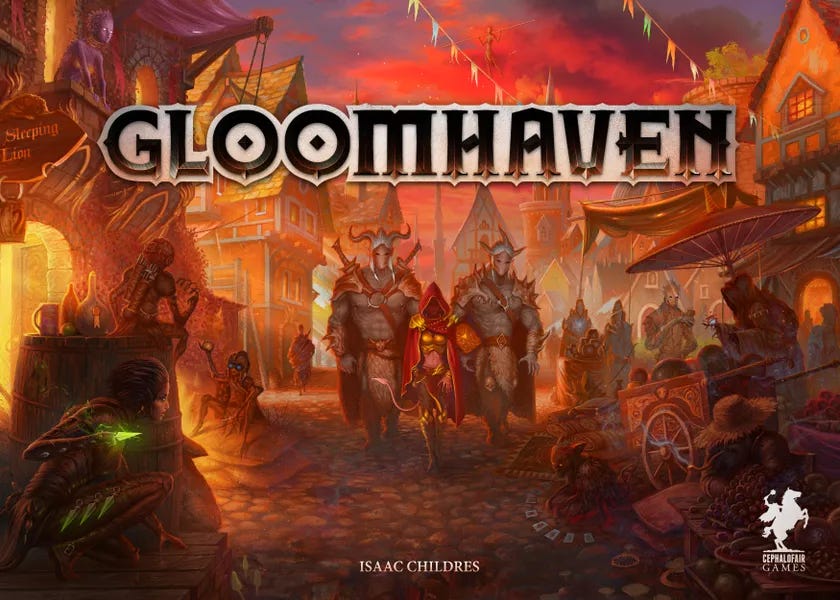
Gloomhaven, a cooperative dungeon crawl adventure, does this by explicitly stating in the rules that players cannot discuss the specifics of the cards in their hands, actions they will take, or numerical values of any kind when selecting actions. All you can discuss is general statements about their actions for the round in order to strategize. This is fairly obviously a rule specifically to stop alpha gamers from running a table, and it does a good job.
In practice, players will say things like “I’ve probably got these 2 enemies taken care of, but pretty slowly,” and everyone else can infer what they can do and how they can help from that limited information. If someone else can do it faster, they can say that, but neither can say the exact initiative number on the card and sometimes you mess up and the turn order is different than you expect. This creates tension and uncertainty that open information wouldn’t, heightening the experience for all kinds of players. It’s a good rule change to affect the quarterbacking problem while simultaneously enhancing the game as a whole for all players.
The Crew is another cooperative game that restricts communication, although it has a specific mechanic for what you can communicate and how frequently. A trick-taking game like Hearts (please read about trick-taking games if you’re unfamiliar or this section won’t make any sense), The Crew asks players to work together to have particular players win specified tricks or cards with the hands they’re dealt.
For example, if one player has the pink 7 and the objective is to have them win the pink 7 in a trick, all the other players need to do is follow with lower-value pink cards and the objective is complete. They play the pink 7 and win the trick with the highest-value pink card.
However, if the objective is to have someone win a pink 7 and they only have low-value blue cards in their hand, the team needs to coordinate to figure out who has the pink 7 and get it into a trick where the correct player can win it with a blue 5. Since players have to follow suit, enough blue tricks need to be played to ensure the person playing the pink 7 can sneak it into a blue trick, and during that time you can just muck it all up and lose.
There are a lot of interesting and difficult situations that can arise in The Crew, but most of the puzzle would be lost if everyone played with open hands or freedom of communication. There would be an obvious correct choice every time and it would be pretty solvable after examining the information.
Instead, The Crew explicitly restricts any discussion of what cards are in anyone’s hands. The only way you can communicate is by laying a special token on a single card from your hand you make public, stating whether it is the highest-value, lowest-value, or only of that suit that you have.
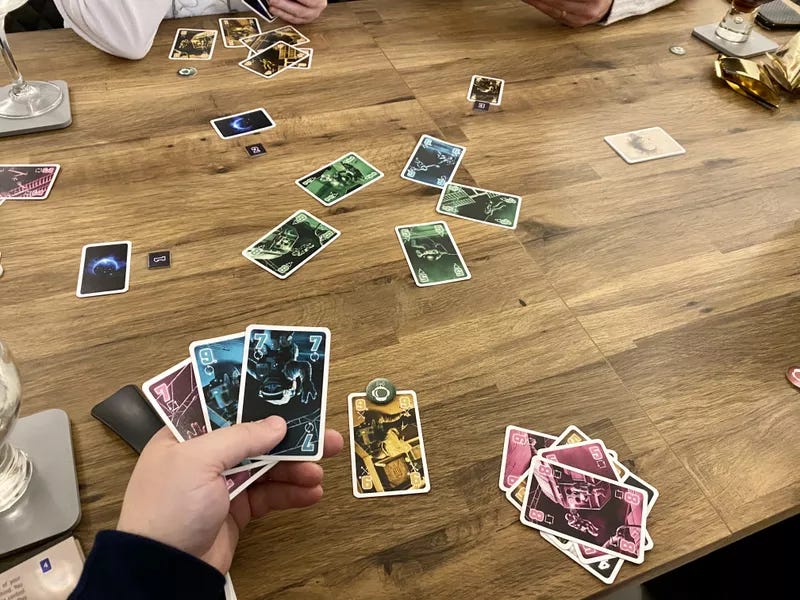
That one piece of information is the only shared knowledge and makes determining the best choice for your own turn much more interesting. It prevents an alpha player from coordinating the whole team, as well as creates much more interesting cooperative depth as you play. The Crew is a perfect example of a cooperative game that is improved by restricting information and how it can be communicated.
2. Simultaneous actions and real-time play.
If you give people as much time as they need to make a decision, they will take all the time they need to get all the information they want before they continue. This can lead to long turns, lots of downtime for the non-active players, or a dominant personality spending other players’ turns “helping” them by telling them what to do.
If turns are simultaneous, everyone is too busy dealing with their own shit to pay attention to someone else’s. If there is a timed element, even better. Players are racing against the clock to accomplish their objectives and don’t have time to look away.
Admittedly, this isn’t for everyone. Some people won’t enjoy being rushed or being unable to get easy input from their teammates. However, some games use these features to great effect to create incredible experiences for the types of players that enjoy it.
XCOM: The Board Game has a companion app for a smartphone or tablet to run the enemy alien invasion elements of the game. It also has a timer for each round so while players are doing their own thing, the app is signaling certain effects or information that they need to react to and any unresolved enemies when time runs out have penalties at the end of the round.
Because each player has their own mini game that requires communicating with at least one other player and time is limited, the round is too hectic for any one player to be able to dominate the game. Players must rely on their teammates and trust them to do their jobs well. Teamwork is required. It is the core experience of the game.
While not strictly cooperative, Captain Sonar is also a great example of a game that uses real-time chaos and simultaneous play to keep everyone in their own lanes. Played in 2 teams of 4, there are separate positions for each player on your submarine that requires their full attention, either navigating, tracking uses of weapons and gadgets, maintaining the craft’s integrity and surfacing when needed, or listening to the enemy team to locate and track their position.
Both teams are racing to do as many actions as they can as quickly as possible because there are no turns. You can just do whatever you can as fast as you are able to communicate it. If someone goes too fast, ignoring a teammate’s warnings, the sub overheats and has to surface which takes a ton of time and reveals your location to the other team.
This game is an exceptional experience at 8 players and has no space for any one player to dominate a team. The roles are so intertwined with one another, relying on others in order to take their own actions and working together towards the common objective, that if everyone isn’t performing their own role 100% of the time it all falls apart.
3. Information overload.
Okay, what if you have access to all the information about the game, all the cards and actions available to all the players is public information, and you have all the time in the world to decide how to act? So far, if you’re following, that’s a recipe for an alpha player to take over. However, that isn’t the case if the game is just too complex, with too much information for one person to grok all of it at once.
Enter Spirit Island, where you take on the role of asymmetrical spirits protecting an island being invaded by colonial settlers. They all function very differently from one another in play with different tools to keep the colonists from building towns and cities across a sprawling board that only allows players to interact with spaces near their tokens. There are so many options at every step of each turn, creating an overwhelming amount of information that a single player can’t really wrap their head around alone.
Sure, if you play solo, the board shrinks to a more comprehensible size and there’s only your one spirit’s mechanics to keep track of, but that’s the point. Every player you add requires another person’s capacity for processing data to get through.
Spirit Island is a game where even if you want another player’s input they are probably too busy figuring out their own turn to give you too much help. There’s just a lot to deal with and even experienced players can only contend with so much at a time.
An unfortunate fault of this is that it can lead to analysis paralysis for some players and a steep learning curve when on-boarding new ones. Spirit Island is a rough teach and when playing with larger groups turns can take a long time. However, I do think that when done well and with intent, oversaturating the players with an abundance of information and choices is still a very good way to add more depth and complexity to the decision making process of a game.
Playing Spirit Island once you are experienced is an absolute treat of coordinating responses because there’s rarely a clear “correct” action to take and everyone is balancing a lot of factors to try and do as much as possible to help the team.
This is the method my co-designer and I are using in our cooperative restaurant game and, as we keep learning through playtesting, adding more and more choices makes each turn more interesting and decisions less obvious. Our barebones game was fun and functioned, but with each playtest we find that adding more obstacles and complexity has made the experience better.
Often designers are told to remove as many elements from a game as needed. Strip it down to the minimum of a game that it can be. I agree. However, with heavier cooperative games, the addition of new systems and mechanics gives a lot more levers to pull when giving the players new challenges and creates are more robust experience to prevent any 1 player being dominant.
Is this even worth it?
I would argue that all of the games I’ve discussed have benefited from the addition of elements that help prevent alpha gamers from taking over a table. Will it stop every aspiring board game quarterback? No, problem players will always exist. It’s not our jobs as designers to try and fix them. However, giving some considerations to how to limit their impact can improve a design overall and is absolutely worth looking at.
Did I miss anything? Are there cooperative games that I didn’t talk about that do something different or you would recommend? Let me know in the comments.
Subscribe to get the Game Lab newsletter in your inbox every other Monday for more discussions about all manner of topics around games and game design.
Thanks for reading. If you enjoyed this or any of my previous posts, give them a like and share them around. It helps a lot.






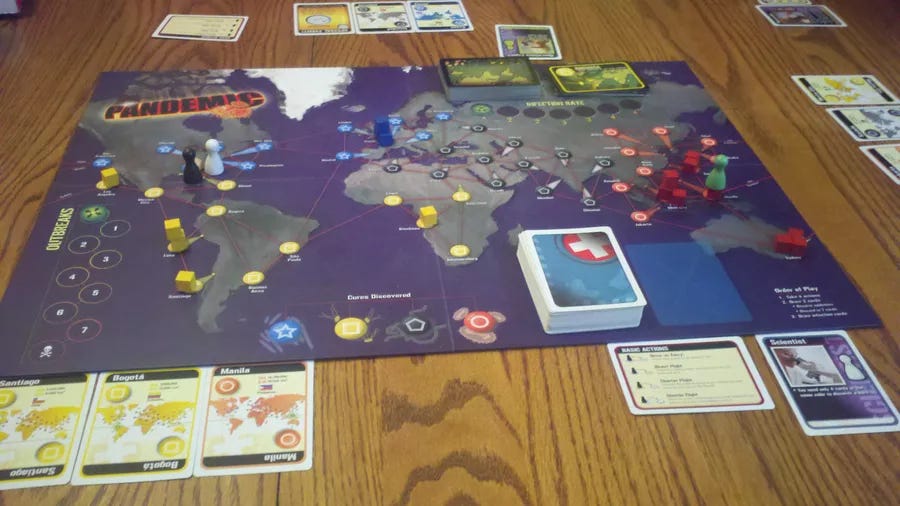
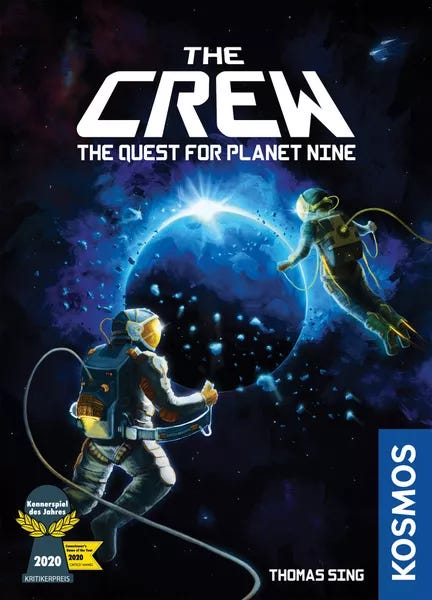
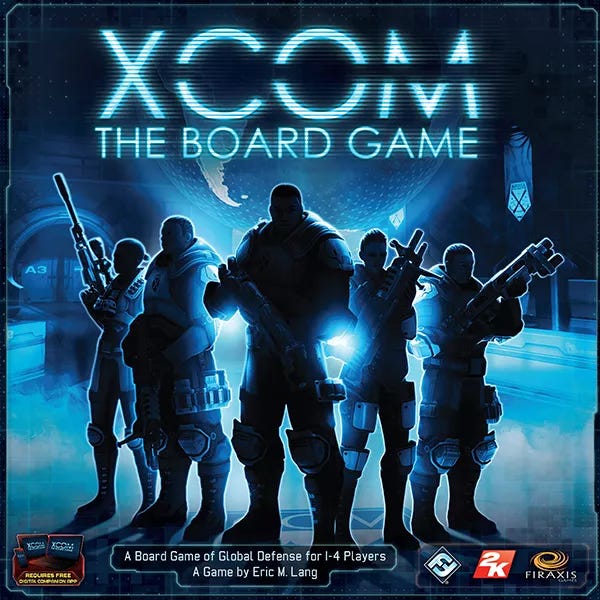

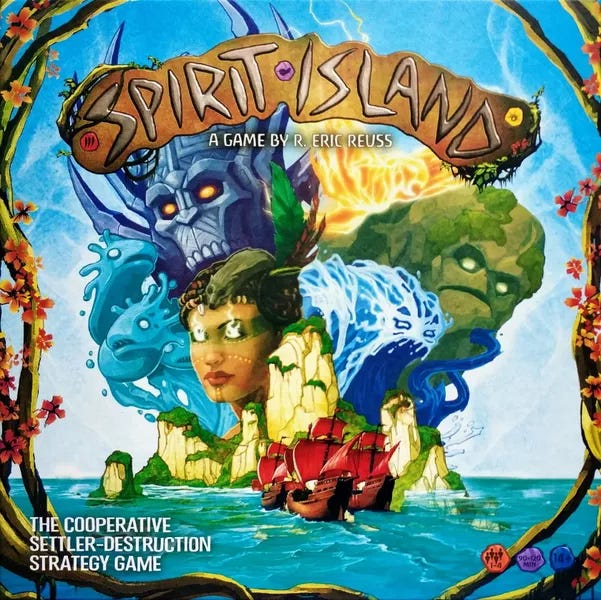
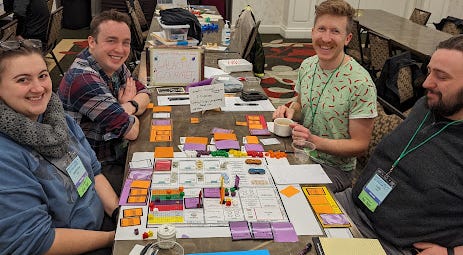
This makes me think of this post https://www.designer-notes.com/game-developer-column-17-water-finds-a-crack/ on the more general problem of gamers compulsively optimizing the fun out of games.
I think Pandemic is a great example of this drive to optimize. I played it for the first time with a couple of friends, then we quickly ramped up the difficulty to find out when we would start losing. We also started consistently planning a couple turns in advance. After playing the game this way many times, we added one more friend who hadn't played the game at all. So we ended up playing a relatively simple game with perfect information on a high difficulty setting, and additionally the difficulty scales with how many people are playing, so we ended up with a dilemma. We could either:
- Not explicitly plan too quickly, giving the other player a chance to catch up, meaning the game went a lot slower and most people at the table were just waiting around for the new guy.
- Plan normally, basically reducing the new player to another resource.
- Have a much higher likelihood of losing explicitly because of the new player. As an aside, this is a pet peeve as well. I feel like there are a lot of cooperative games that punish you too much for adding another player. The new player becomes a liability and no one likes feeling like a liability. Then the alternative is of course playing a long game at a level of difficulty you already find easy. "Getting the new player up to speed" will inevitably mean some level of quarterbacking, as they are just told what the optimal strategy in a situation is. At this point, you're often just better off playing some other game entirely.
I'm a big fan of TTRPGs, I like being able to make fun and unique characters, but I still find myself compulsively looking up builds just to make sure I'm not leaving out some core class feature or trading too much effectiveness for flavor. This sucks! This is especially bad because I feel like TTRPG characters who are over-optimized stop being interesting individuals with a fun toolset to improvise with, but instead finely tuned machines that do one thing very well.
I'm trying to fix this in my own TTRPG. I have a draft where I'm organizing skills into "archetype tables" with a couple of semi-random mechanics for character progression. One idea is to have the main method of character progression be having players spend points to roll a couple of dice on an archetype table and choose one of the skills they landed on. Players would get access to new tables by aligning with some faction or learning from some person. Of course, this undercuts a basic sort of character freedom that I think TTRPG players expect, so maybe this is a terrible idea! Hopefully it lessens analysis paralysis and the drive to optimize, trading it for a rogue-lite sort of restrained/randomized set of choices.
Anyway, good post.
This is a great read!
I definitely struggle to avoid “quarterbacking” myself in cooperative games. Probably because my brain likes solving puzzles and has very few opportunities to do so (that are enjoyable at least. Life has plenty of problems, but they are rarely any fun 💀).
I’m also used to managing a household, which can be tricky to remember to temporarily turn off.
I love cooperative games most, so it’s something I try to stay aware of.
Built in mechanics like the ones you described can help those of us that can be overbearing as well!
(Well, those of use that would rather not be at least)
Something else I’ve noticed some games do to help mitigate the quarterbacking problem is assigning roles to players, some of which are heavier on information/resource management, coordination, and problem solving than others.
When balanced cleverly this can work quite well, with the players functioning like a well designed RPG party.
But that balancing certainly seems tricky!
You need the simpler roles to be (at least) as vital to the team as the harder ones to manage.
And the more complex ones still need to feel worth playing and rewarding.
You don’t want players left feeling cheated, unappreciated, or entirely unnecessary.
Or end up with some players needing much longer than others to take their turns.
(Spirit Island also does this well imo)
I think you see some similar mechanics and balancing considerations in non cooperative games that assign drastically different gameplay mechanics to each character.
(Root comes to mind as a good game with drastically different mechanics for each character)
It is very fun mechanically, but it is often a bit rough figuring out which role/play style works best for you as a player. That can take several play-throughs, which is definitely not everyone’s cup of tea, and can be an unfun and discouraging process.
It’s also pretty easy to end up with at least one role in those types of games that are unbalanced (just bad) and never get used at all.
I think cooperative games have the upper hand with this design actually, as other players can at least assist and support a new player while they’re learning the ropes.
Even with an overbearing teammate, that is slightly less terrible than being completely steamrolled your first few times (or more) in a competitive game while you try to get your footing and find your preferred role.
(The longer the game, the worse that feeling!)
Look forward to playtesting your space restaurant game again sometime and seeing how it’s evolving!